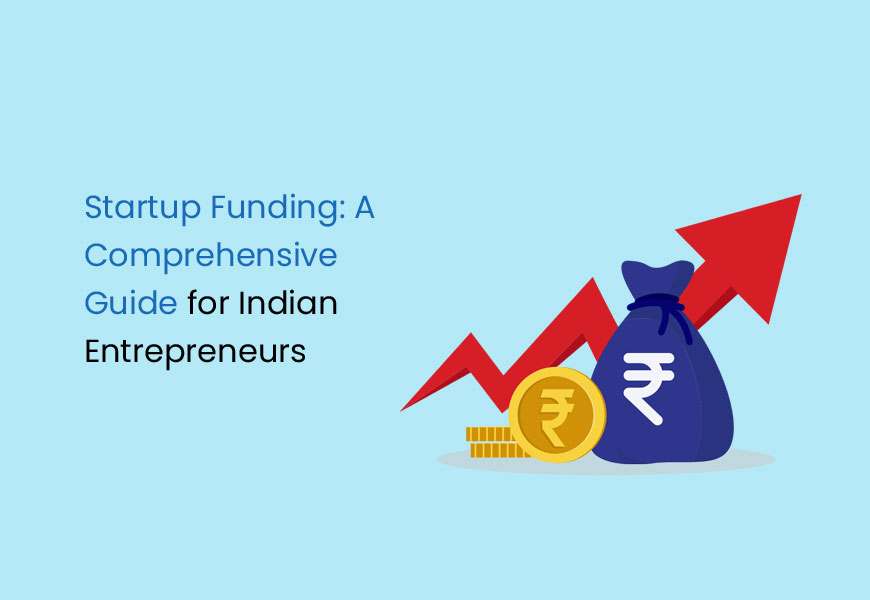Every one of us has thought about quitting our corporate jobs to start working for ourselves at least once. Nobody can deny that working on one’s business is a lucrative idea. The idea of entrepreneurship is easy to dream of but difficult to put into work. Having a functioning business plan is definitely the first step towards climbing the ladder towards fruition but what comes after? How do you materialise your startup idea into a functioning business?
This article shall deal with these questions and more. The aim is to give you all the information you need about startup funding and the means to apply for it. So, if you are feeling clueless, this is your ultimate find!
The Current Startup Market in India
The startup market in India saw a sharp boom in the last few years. As of 31st May 2023, India has emerged as the third largest ecosystem for startups on a global level while it ranks second in innovation quality, grabbing top positions in the quality of scientific publications and universities among the middle-income economies.
Within the years 2015 and 2022, India has seen tremendous growth.
- The total funding for startups had increased 15 times.
- The number of investors has increased 9 times.
- The number of incubators has increased 7 times.
India is also home to 108 Unicorns, privately owned companies that have a market capitalisation of over $1 billion. Their total evaluation is above $340 billion. What is even more surprising is the fact that out of these 108 Unicorns, 44 were started in the year 2021, and 21 were started in 2022. The growth has been exponential for these firms. These are outstanding stats that are reflective of the business acumen present in the country.
The future of startups and entrepreneurship is bright, making the need for funding in the field increasingly imperative.
Types of Startup Funding
Choosing the right way to finance your business is a crucial decision for most founders. There are various funding options available, each with its own set of considerations, including regulatory, tax, and legal issues. This is why we have compiled a list for you to help you make this decision better.
1. Bootstrapping
Bootstrapping involves funding your business using personal savings, credit cards, or any other personal resources without relying on external investors or loans.
Pros
- Credibility and Focus: Bootstrapping showcases your commitment and determination to potential investors, gaining their trust.
- Control: You retain complete control over your business operations, allowing for agile decision-making.
- Focus on Growth: Owners can concentrate on product development and business growth instead of constantly fundraising.
- Disciplined Decision-Making: Limited resources encourage careful spending and financial discipline.
Cons
- Limited Networking: Lack of external investors may limit your access to valuable networks and industry connections.
- Sustainability: If profits aren’t generated quickly, sustaining operations can become challenging.
- Financial Strain: Owners may face personal financial stress, and the team might be stretched thin due to limited resources.
- Slower Growth: The absence of substantial funding can slow down the company’s expansion plans.
2. Angel Investors
Angels provide funding in the early stages of a business when it lacks an established customer base but has a promising idea. Angels take substantial risks by investing in unproven startups, often when traditional lenders won’t.
3. Venture Capital
Investors offer industry expertise and valuable networks, aiding business growth. Associating with reputable investors can enhance the startup’s credibility and attract more customers and partners. Unlike loans, equity investments don’t require interest payments, reducing the financial burden.
Pros
- Expertise and Networking: Investors offer industry expertise and valuable networks, aiding business growth.
- Reputation Enhancement: Associating with reputable investors can enhance the startup’s credibility and attract more customers and partners.
- No Interest Payments: Unlike loans, equity investments don’t require interest payments, easing the financial burden.
Cons
- Equity Dilution: Founders must give up a significant portion of their ownership, reducing their control over the company.
- Resource Intensity: Securing deals with investors demands substantial time, effort, and resources, diverting focus from core operations.
- Complex Governance: With external investors come complex governance structures, potentially impacting decision-making processes.
- Control Transfer: Control shifts to investors, leading to a loss of autonomy in strategic decisions.
4. Crowdfunding
Crowdfunding is the practice of gathering small amounts of money from a large group of individuals. The transactions are typically done via online platforms.
Pros
- Product Development: Funds raised can cover production and development costs, enabling you to create and refine your product.
- Market Validation: Successful crowdfunding campaigns demonstrate market demand and validate your business idea.
- Brand Awareness: Crowdfunding campaigns, especially on social platforms, boost brand recognition and attract potential customers.
- Customer Feedback: Interacting with backers provides valuable insights, helping you improve your product or service.
Cons
- Funding Limitations: Funds obtained might not be enough for large-scale market entry or sustained operations.
- Regulatory Costs: Equity-based crowdfunding involves significant legal and regulatory expenses, increasing overall costs.
- Operational Challenges: Meeting customer demands and delivering on promises can be operationally challenging.
- Resource Intensity: Managing a crowdfunding campaign demands considerable time and effort.
Government Initiatives
The entrepreneurial acumen of Indians has not gone unnoticed by the government, which is why they have proactively launched several initiatives to help startups turn into booming businesses. We have discussed some in great detail below.
NIDHI
The NIDHI initiative, or National Initiative for Developing and Harnessing Innovations, represents a groundbreaking effort in India aimed at nurturing innovation, supporting emerging startups, and cultivating a dynamic entrepreneurial ecosystem. This comprehensive program comprises various components designed to drive the growth of innovation-driven enterprises across the nation.
- One significant facet of the initiative is NIDHI-PRAYAS, which focuses on translating innovative ideas into tangible prototypes. It provides crucial mentoring and financial support at the Proof-of-Concept level.
- The NIDHI Entrepreneurs-In-Residence (EIR) Program grants fellowships to students dedicated to entrepreneurship, nurturing and empowering the next generation of entrepreneurs.
- The NIDHI Seed Support Program offers vital early-stage seed funding, enabling startups to embark on their innovation journey.
- The NIDHI Accelerator Program plays a pivotal role in enhancing startups’ investment readiness, equipping them with essential resources necessary for growth and scalability.
- Moreover, the initiative establishes state-of-the-art Technology Business Incubators (TBIs) and Centres of Excellence (CoE), fostering innovation in diverse technology sectors.
- The NIDHI-Inclusive Technology Business Incubators (iTBI) Program focuses on strengthening the innovation and startup incubation ecosystem in Tier II and Tier III cities, promoting entrepreneurial inclusiveness across various demographics.
Startup India
Startup India, a key initiative by the Indian Government, aims to create a vibrant environment for innovation and startups. The goal is to boost sustainable economic growth and create numerous job opportunities. This initiative aims to create a culture of empowerment by promoting innovation and design.
To achieve these goals, the Government of India introduced an Action Plan on January 16, 2016. This plan focuses on three main pillars:
- Simplification and Support: Making the startup journey simpler and providing necessary guidance.
- Funding and Incentives: Offering financial support and incentives to encourage startup growth.
- Partnerships and Incubation: Encouraging collaboration between industries and academia while supporting startup incubators.
Startup India strives to simplify processes, provide financial aid, and promote partnerships, fostering a thriving startup culture in the country.
Startup India Seed Fund Scheme (SISFS)
The Startup India Seed Fund Scheme (SISFS) is a financial initiative aimed at supporting startups in various stages of development. This fund provides crucial assistance for activities like proof of concept, prototype development, product trials, market-entry, and commercialisation. By offering financial support at these critical stages, SISFS empowers startups to transform their innovative ideas into tangible products and services, fostering entrepreneurial growth.
National Startup Awards
The National Startup Awards recognise and reward exceptional startups and the entities that facilitate their growth within the entrepreneurial ecosystem. This initiative is a way of acknowledging the significant contributions made by startups and ecosystem enablers. By spotlighting outstanding innovations and competitive spirit, these awards not only honour the winners but also inspire others, encouraging a culture of innovation and competition that fuels economic dynamism.
SCO Startup Forum
The Shanghai Cooperation Organisation (SCO) Startup Forum, inaugurated in October 2020, stands as a collaborative effort among member countries. Its primary goal is to enhance and nurture startup ecosystems collectively. By fostering international collaboration, knowledge exchange, and resource sharing, this forum strengthens the entrepreneurial landscape across participating nations. It signifies a shared commitment to fostering innovation and supporting emerging businesses on a global scale.
Prarambh Summit
The Prarambh Summit serves as a global platform, bringing together startups and young innovators from diverse backgrounds. This event provides an opportunity for creative minds worldwide to showcase their ideas, innovations, and inventions. By facilitating interactions between entrepreneurs and innovators, the summit promotes the exchange of groundbreaking concepts. It acts as a catalyst for collaboration, encouraging the birth of new ideas and fostering an environment of innovation on an international scale.
SIDBI Fund of Funds Scheme
The Government of India initiated the SIDBI Fund of Funds Scheme, allocating a substantial fund of INR 10,000 CR to bolster the Indian startup ecosystem. Launched in June 2016 and managed by the Department for Promotion of Industry and Internal Trade (DPIIT), this Fund of Funds for Startups (FFS) doesn’t directly invest in startups. Instead, it provides capital to SEBI-registered Alternate Investment Funds (AIFs), known as daughter funds. These AIFs, in turn, invest in promising Indian startups, thus catalyzing private investments and fostering growth.
SIDBI has been entrusted with the responsibility of overseeing the FFS. As of February 28, 2023, SIDBI has committed INR 8294.95 crores to 103 AIFs. Additionally, INR 3,654.89 crores have been distributed to 74 AIFs, channelling a total of INR 14,828 crores to support 818 startups across various stages of development.
Startup India Seed Fund Scheme
The Department for Promotion of Industry and Internal Trade (DPIIT) has introduced the Startup India Seed Fund Scheme (SISFS) with a budget of Rs. 945 CR. This scheme aims to provide vital financial aid to startups, enabling them to develop proof of concepts and prototypes, conduct product trials, and eventually enter the market. The SISFS empowers these startups to mature to a level where they can attract investments from angel investors and venture capitalists, or secure loans from commercial banks and financial institutions. The scheme plans to support around 3,600 entrepreneurs through 300 incubators over the next four years. Eligible startups will receive funding through recognized incubators all over India.
Startup India Investor Connect
The government launched Startup India Investor Connect during the sixth meeting of the National Startup Advisory Council (NSAC) on March 11, 2023. This dedicated platform serves as a bridge connecting startups with investors. Its purpose is to promote entrepreneurship, facilitate engagements, and accelerate collaborations across various sectors, stages, geographies, and backgrounds, addressing the diverse needs of the ecosystem.
Key Features of the Portal
- Investment Opportunities: The portal facilitates startups in showcasing their ideas to potential investors, providing visibility and creating avenues for investment.
- AI-Based Matchmaking: Utilising AI technology, the platform connects startups with investors tailored to their specific requirements, enhancing compatibility and fostering meaningful partnerships.
- Access to Emerging Cities: The platform extends its reach to emerging cities, bridging the gap between investors and startups in regions with burgeoning entrepreneurial potential.
- Virtual Marketplace: A virtual marketplace is established, enabling investors to discover innovative startups that align with their criteria, promoting seamless collaboration and investment.
What Do You Need To Check Off Before Applying for Funding?
Before you start seeking funding, there are some boxes that you need to fill. Below, we have put together a checklist for your reference of everything you need before applying for funds.
- Determine Your Needs: First, calculate your financial requirements. Identify specific expenses crucial for your business, be it operations, scaling, or startup essentials.
- Consult Experts: Seek guidance from professionals like CFOs, accountants, bookkeepers, and tax experts. Their insights can help you optimise your funds effectively.
- Explore Funding Options: Keep your options open. Consider loans, grants, investors, or personal contributions from family and friends. Evaluate terms such as repayment schedules, interest rates, and usage restrictions.
- Review Terms and Conditions: Carefully examine the terms and conditions associated with funding options. Look for favourable repayment terms, manageable interest rates, and clear guidelines on fund usage.
- Demonstrate Business Activity: Show evidence of an active business to potential funders. Prove your commitment through sales efforts and a concrete business plan. Having a functional website and a dedicated business account enhances your credibility.
Stages of Startups
Starting your own business is a daunting task, as you have to spearhead all end-to-end operations. Let’s go through the steps involved.
Ideation
During the ideation stage, entrepreneurs are shaping their ideas. At this point, funds needed are minimal, and formal funding options are scarce.
- Pre-Seed Stage
- Bootstrapping/Self-financing: Start and grow the business using personal savings and generated revenue. No external investment is involved.
- Advantages: This puts you in charge and lets you maintain full control, all while having no pressure to repay funds.
- Friends & Family
- Seek financial support from close ones due to the existing trust.
- Advantages: There is a trust-based relationship and the terms involved are informal.
- Business Plan/Pitching Events
- Compete in business plan events for prize money or grants.
- Advantages: Potential funding for a strong business plan.
Remember, securing external funds is time-consuming, often taking over 6 months to materialise. Choose funding sources that align with your startup’s stage of development.
Validation
During the validation stage, a startup has a prototype and aims to confirm the demand for its product/service through a ‘Proof of Concept (POC)’ before the big market launch.
Seed Stage
At the seed stage, a startup conducts field trials, tests the product with potential customers, and assembles a formal team. Funding options include:
- Incubators: Organisations aiding entrepreneurs by providing office space, utilities, legal assistance, and sometimes grants, debt, or equity investments. There are multiple benefits to this. You get access to valuable resources, mentorship, and potential funding avenues, to mention some of them.
- Government Loan Schemes: Government initiatives offering collateral-free debt to aspiring entrepreneurs, such as the Startup India Seed Fund Scheme and SIDBI Fund of Funds. This is a great option for multiple reasons: low-cost capital offering reduced financial risk for startups being the major one.
- Angel Investors: Individuals investing in high-potential startups in exchange for equity. Connect with angel networks like Indian Angel Network, Mumbai Angels, Lead Angels, Chennai Angels, etc., or industry experts. This option offers you financial support, industry expertise, and valuable connections.
- Crowdfunding: Raising funds from a large number of contributors, each contributing a small amount, typically done through online crowdfunding platforms. This option gives you a broad investor base, early customer engagement, and validation of the startup’s idea.
Early Traction
During this stage, startups have introduced their products or services to the market. Essential metrics such as customer base, revenue, and app downloads play a crucial role in evaluating performance and growth.
Series A Stage
Here, startups raise funds to expand their user base, enhance product offerings, and enter new markets. Common funding sources include:
- Venture Capital Funds: Professionally managed funds investing in high-growth startups. Each fund has specific criteria aligning with preferred sectors and startup stages. In exchange for investment, VCs acquire equity and actively mentor startups. It offers you expert guidance, substantial funding, and industry connections.
- Banks/Non-Banking Financial Companies (NBFCs): Startups with proven market traction and revenue can secure formal debt from banks and NBFCs, especially for working capital needs. Debt funding does not dilute equity stakes. It gives you access to working capital, financial stability, and business expansion opportunities.
- Venture Debt Funds: Private investment funds primarily offer debt to startups, often in conjunction with angel or VC rounds. It helps you gain additional financial support, flexibility in repayment, and less dilution of equity ownership.
Scaling
During this phase, the startup experiences accelerated market expansion and increasing revenues, indicating a robust growth trajectory.
Series B, C, D & E Stages
In these advanced stages, startups secure funding from:
- Venture Capital Funds: VC funds with larger investment capacities provide funding for mature startups that have demonstrated significant market traction. Startups should approach these funds after establishing a strong market presence. This method gives you substantial funding, strategic guidance, and potential partnerships.
- Private Equity/Investment Firms: While traditional private equity firms don’t typically invest in startups, some have started funding late-stage startups with consistent growth records. You gain access to significant capital, industry expertise, and resources for scaling operations.
Exit Options
Startups have several exit strategies when investors decide to leave, or entrepreneurs wish to move on:
- Mergers & Acquisitions: Investors sell the startup to another company, either wholly or partially. It involves the consolidation of two companies, either by acquiring or being acquired. Investors can profit from their investment, and the startup gains resources and expertise from the acquiring company.
- Initial Public Offering (IPO): The startup goes public by listing on the stock market for the first time. This process is complex and is typically undertaken by highly profitable startups with consistent growth. This helps you raise substantial capital, enhance visibility, and allow early investors to sell their shares.
- Selling Shares: Investors sell their equity stakes to other venture capital or private equity firms. This step provides liquidity for existing investors, allowing them to exit while new investors can join.
- Buybacks: Startup founders repurchase shares from investors using available funds, regaining control of the company. This is how founders regain control, aligning the company’s vision with its original creators’ goals.
What Do Investors Look For?
This is an interesting question because the market is hot right now, with great ideas surrounding us. What will set your product apart? Investors closely evaluate startups based on various factors to gauge their potential for investment. Let’s break that down by diving into the psyche of investors.
- Clear Objective and Problem-Solving: Startups offering unique solutions to specific customer problems stand out. Ideas or products protected by patents signal high growth potential, attracting investor interest.
- Team and Management: Investors assess the founders’ passion, experience, and skills. A strong, dedicated management team capable of driving the company forward is equally crucial.
- Audience and Market Landscape: Investors analyse market size, potential market share, product adoption rates, and historical/forecasted growth rates. Understanding macroeconomic drivers in the targeted market is essential.
- Scalability and Sustainability: Investors seek startups with scalable potential and a stable business plan. Factors such as barriers to entry, growth rate, and expansion plans are key considerations.
- Customer Base and Supplier Network: Clear identification of buyers and suppliers is vital. Investor interest is piqued by strong customer relationships, product loyalty, vendor terms, and existing vendor partnerships.
- Competitive Analysis: Investors assess market competitiveness, including the number of players, market share, and future obtainable shares. Understanding product differentiators vis-à-vis competitors is crucial.
- Marketing and Sales: Investors examine sales forecasts, target audience strategies, product mix, and customer conversion/retention ratios. Effective sales and marketing plans are essential for market penetration.
- Financial Assessment: A detailed financial model showcasing cash flows, required investments, key milestones, break-even points, and growth rates is crucial. Transparent, reasonable assumptions are essential.
- Exit Avenues: Startups that outline potential acquirers or alliance partners demonstrate strategic vision. Investors are interested in exit options, including IPOs, acquisitions, and subsequent funding rounds.
Success Stories
Now that you are armoured with the knowledge of all things technical and important, turn your focus to the startups that have already made it big.
BoAt
Founded in 2016 by Aman Gupta and Sameer Mehta, BoAt is an Indian-based company renowned for its high-quality audio devices and smartwatches. Recognized globally as one of the top 5 audio system manufacturers, the company’s products are acclaimed for their exceptional performance and durability. BoAt’s assets have surged to an estimated $10 Billion, marking a remarkable ascent in the industry.
Paytm
Launched in 2010 by Vijay Shekhar Sharma, Paytm stands as a leading Indian company specialising in online payment services, financial solutions, and e-commerce. With nearly 20 million active users choosing Paytm as their preferred payment mode, the company has become a fintech giant. Its current estimated value stands at $16 Billion, reflecting its significant impact on the global market.
Meesho
Founded in 2015 by Vidit Aatrey and Sanjeev Barnwal, Meesho is an Indian e-commerce platform celebrated for its direct business approach. This innovative model allows entrepreneurs to connect directly with customers, bypassing traditional distribution channels. The company boasts a valuation of approximately $4.9 Billion and has attracted substantial investments, including from notable backers like Fidelity Management and B Capital.
OLA
Established in 2010 by Ankit Bhati and Bhavish Aggarwal, Ola is a Bangalore-based startup that revolutionised the cab services industry. Beyond offering cab services, Ola extends its reach to bike rides, taxis, and local transportation solutions. With an impressive investment funding of around $3.8 Billion from diverse global investors, Ola has become a pivotal player in the transportation sector.
PharmEasy
Started in 2015 by Dharmil Sheth, PharmEasy is a leading healthcare industry player in India. Specialising in healthcare delivery services, the company caters to both consumers and healthcare establishments, facilitating sample acquisitions and transportation. PharmEasy has garnered significant attention from investors, securing approximately $651.5 Million in funding for its current and upcoming projects.
CRED
Launched in 2018 by Kunal Shah, CRED is a Bangalore-based startup redefining credit card services. It offers customers various incentives on credit card billings. With a funding of $472.1 Million, CRED has attracted a multitude of investors, reflecting the confidence placed in the company’s innovative approach to financial services.
In Conclusion
Everybody wants to work for themselves, but the fact is that only a few know how to make it work, and even fewer get it right. Don’t let this knowledge deter you from your goals, but rather motivate you to become more focused and streamline your goals and resources in a manner that is the most effective. This guide has detailed everything you need to know about startup funding as well as what are the measures to achieve funding. Now that you have learnt the secrets to secure funding, gear up to achieve your dreams. And if you are looking for a seamless workforce management solution, explore TankhaPay. Reach out to us today.
FAQs on Startup Funding
How Do Investors Evaluate Startups?
Investors assess startups based on team expertise, market potential, scalability, unique value proposition, and financial viability. A compelling pitch, a strong business plan, and a realistic valuation are essential.
What's the Importance of a Solid Business Plan?
A well-detailed business plan showcases startup vision, target market, revenue model, and growth strategies. It instils investor confidence, demonstrating the startup's clarity and potential for success.
What Role Does Valuation Play in Funding Rounds?
Valuation determines the startup's worth and the equity investors receive. Balancing a fair valuation with attracting investors is crucial. Startups often reassess valuation during subsequent funding rounds based on growth and market trends.
How Can Startups Prepare for Due Diligence?
Startups should organise financial records, legal documents, intellectual property details, and operational processes. Transparency, honesty, and readiness to address investor concerns enhance the due diligence process, fostering investor trust.
Disclaimer: All the information published is in good faith and for general information purposes only and is designed only to provide general information on startup funding.





















